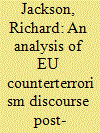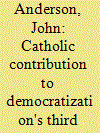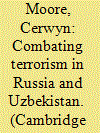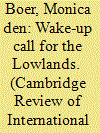|
|
|
Sort Order |
|
|
|
Items / Page
|
|
|
|
|
|
|
| Srl | Item |
| 1 |
ID:
080538


|
|
|
|
|
| Publication |
2007.
|
| Summary/Abstract |
This article examines the main characteristics and evolution of European Union counterterrorism discourse, primarily through a comparison with United States counterterrorism discourse since September 11. It argues that while both actors share a great deal in common in the language they employ about terrorism, there are a number of subtle but highly significant differences. The article also argues that there have been a number of important evolutions in the discourse of EU officials over the past five years. The article concludes that the nature and construction of official EU terrorism discourse has a number of important analytical, normative and practical implications, not least because it rests upon a series of highly contested assumptions and narratives about the nature and causes of the terrorist threat
|
|
|
|
|
|
|
|
|
|
|
|
|
|
|
|
| 2 |
ID:
080608


|
|
|
|
|
| Publication |
2007.
|
| Summary/Abstract |
This article examines the contribution of the Roman Catholic Church to democratization's 'third wave'. Whilst making no substantive claims about the centrality of religion to political transitions, it indicates several ways in which national Catholic hierarchies and the wider Catholic Church contributed to democratization. Of more interest, however, is the question of why the Catholic Church shifted from its traditional position of hostility to democracy. Three primary explanations are offered for the Catholic contribution: theological change, the pursuit of hegemony and the attempt to maintain market share. All three offer useful insights, though this article ultimately suggests that a combination of internal change and contingency is key to understanding this phenomenon
|
|
|
|
|
|
|
|
|
|
|
|
|
|
|
|
| 3 |
ID:
080542


|
|
|
|
|
| Publication |
2007.
|
| Summary/Abstract |
This article aims to offer a preliminary assessment of Russian and Uzbek attempts to combat terrorism after 9/11. While both cases fit into the larger post-Soviet political narrative, itself shaped by strategic realignments following the events of 9/11, relatively little work has been undertaken to analyse how terrorism and law enforcement have intertwined in order to generate military, legislative and police responses in these countries. Thus, while recognizing how security policies changed in Russia and Uzbekistan immediately after 9/11, this paper argues that policy reactions to home-grown terrorism have, for the most part, continued to be the main driving force behind attempts to combat terrorism. Equally, however, the latter part of this paper argues that a more nuanced account of security in the North Caucasus and Central Asia is needed in order to study terrorism effectively. In particular, the emergence of suicide terrorism in Russia and Uzbekistan raises important issues, not just about post-9/11 law enforcement, but also identity politics, illustrating how diverse local, regional and international forms of identification shape International Relations theory
|
|
|
|
|
|
|
|
|
|
|
|
|
|
|
|
| 4 |
ID:
080537


|
|
|
|
|
| Publication |
2007.
|
| Summary/Abstract |
This article seeks to establish a context for the other contributions to this special issue. Using the lens of strategic culture, the article tries to explore how states from Europe and Asia have responded to the US-led 'war on terror'. It argues that the nature of the threat from international terrorism requires states in Europe and Asia to develop a range of external and internal policy responses. Europe has been able to react to this changing strategic environment more successfully because of the pre-existing pattern of interstate cooperation as well as the organizational framework of the European Union. The United States has been more successful in imposing its counterterrorism priorities upon particular Asian states due to the absence of mature frameworks for international cooperation within the region
|
|
|
|
|
|
|
|
|
|
|
|
|
|
|
|
| 5 |
ID:
080540


|
|
|
|
|
| Publication |
2007.
|
| Summary/Abstract |
In response to the threat of terrorism following 9/11, the European Union has opted for a clear cross-border law enforcement approach that is quite distinct from the putative 'war on terror'. This choice has been determined by factors of history, divergent threat perceptions, relative value orientations and restricted competences. And yet, far from limiting itself to a traditional 'internal' law enforcement focus, the EU has developed an extensive multidimensional approach that combines legislative and operational, repressive and preventive, internal and external, as well as institutional, measures. But weaknesses persist: the preference given by member states to instruments of cooperation and coordination, rather than integration, as well as the poor implementation of many agreed-upon measures, negatively weigh against the effectiveness of the EU's multidimensional law enforcement approach. Legitimacy deficits also exist owing to limited parliamentary and judicial control. These deficits will need to be addressed to reinforce the credibility of the EU's approach as a viable 'European' alternative to the US 'war on terror'.
|
|
|
|
|
|
|
|
|
|
|
|
|
|
|
|
| 6 |
ID:
080609


|
|
|
|
|
| Publication |
2007.
|
| Summary/Abstract |
Christian missionaries, especially from Anglo-American Protestant denominations, have been remarkably successful in their effort to plant 'self-propagating, self-supporting, self-governing' churches throughout the world and especially in sub-Saharan Africa. Today's international non-governmental organizations and inter-governmental organizations engaged in development, humanitarian assistance, peace-building and human rights resemble 'secular missionaries' spreading their gospel of democracy, good governance, peace, justice and sustainable development. This article investigates the extent to which today's secular missionaries might learn from the indigenization of Christianity in sub-Saharan Africa. I conclude that an essential ingredient in the missionary strategy of evangelization is conspicuously absent in contemporary programmes of development, democratization, or peace-building. In particular, the extensive efforts devoted by Protestant missionaries to the translation of their Biblical message into local languages and symbolic repertoires bear little resemblance to efforts to transplant Western ideals of universal human rights or the institutional templates of democratic governance first developed in the United States and Western Europe
|
|
|
|
|
|
|
|
|
|
|
|
|
|
|
|
| 7 |
ID:
080539


|
|
|
|
|
| Publication |
2007.
|
| Summary/Abstract |
This study explores global and regional war on terror discourses. It focuses upon language construction 'framing' the character of, and global and regional responses to, terrorism. It is concerned with social power and critiques the war on terror discourse globally and in Southeast Asia. Central to this are constructions of Islam. The analysis assesses the complexities behind often essentialized depictions of Islam. The paper argues that a deeper understanding of the complexities of the discursive dimension of the war on terror can help provide an additional understanding of the ideational background for operational counterterrorism policies and practices.
|
|
|
|
|
|
|
|
|
|
|
|
|
|
|
|
| 8 |
ID:
080541


|
|
|
|
|
| Publication |
2007.
|
| Summary/Abstract |
The Netherlands is one of the few countries in Western Europe that did not experience massive terrorist attacks and where counterterrorism actions did not feature prominently on the political agenda. Until quite recently, the Netherlands had neither emergency legislation for terrorist incidents nor a specific Act that criminalized terrorist offences. In response to the European Union framework legislation, a bill was produced that penalizes participation in a terrorist organization, flanked by a vast array of other measures. This article analyses the policy, institutional and legislative responses to terrorism in the Netherlands and compares these with responses from other European states. The events of 9/11, as well as the political and public anxiety over the murders of Pim Fortuyn and Theo van Gogh, acted as a firm wake-up call for the Netherlands insofar as the threat of terrorism is concerned. Whilst most countries adopted an incremental approach to countering terrorism, the Netherlands witnessed a radical shift in criminal justice and law enforcement policy following these events
|
|
|
|
|
|
|
|
|
|
|
|
|
|
|
|
|
|
|
|
|